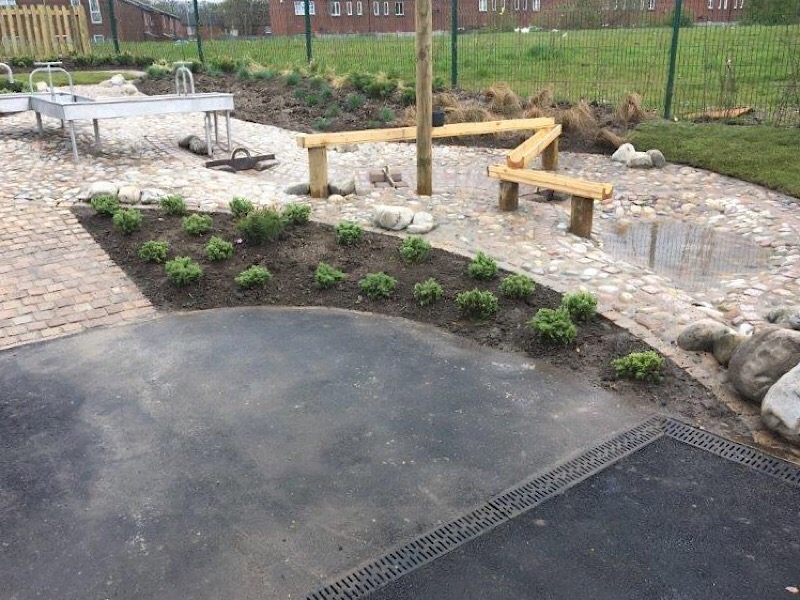News

The value of Water Play in Schools
Posted by Nick Riley on 1st Oct, 2018 |What can children learn from water play?
https://www.communityplaythings.co.uk/learning-library/articles/making-the-most-of-water-play
This article says it all, we build it all !
Thoughtfully prepared, a water centre, whether indoors or out, can foster cognitive development, teach mathematics and science concepts, enhance physical skills, promote social learning and cooperative effort, and enrich language experiences.
Cognitive development. Modern cognitive psychology holds that children have a drive to make sense of their world (Piaget 1954). Given ample opportunities to manipulate materials in the environment, children build mental maps or frameworks through which concepts are developed. Furthermore, children assimilate new information into existing mental maps to refine and extend the concepts they have built (Wadsworth 1989).
When new information does not fit into an existing framework, the structure must be adjusted to accommodate the new input. This lack of fit is very important for teachers because, for us, it means that puzzling, novel situations can promote learning. For example, a child playing with a variety of objects in water might come to the mistaken conclusion that heavy objects sink and light objects float. The child has built incomplete mental maps for the concepts, “objects that float” and “objects that sink.” If that child comes across an object that is heavy and also floats, such as a log, she will experience disequilibrium – cognitive dissonance – clashing beliefs. Because a heavy object that floats will not fit in the child’s mental framework for floating and sinking, the child will be challenged to adjust her thinking framework.
Without the time and opportunity for lots of exploration, a child formulates fewer meaningful concepts. While water play promotes problem-solving and thinking skills in general, it is particularly well suited to the development of concepts in mathematics and science.
Learning mathematics. Depending on which materials the teacher selects to incorporate into the water centre, specific mathematical concepts can be built. The following list contains a sample of mathematical concepts that can be built through water play. You and the children will think of even more.
| empty/ full | many/ few | before/ after |
| thick/ thin | more/ less | same/ different |
| heavy/ light | shallow/ deep | greater/ less than |
| sets | classification | rational counting |
| liquid measure | ordinal counting | linear measure |
Learning science. Water play leads children to ask questions (Chaille & Britain 1991). What does it do? How can I change it? Curiosity leads to experimentation, which provokes even more curiosity and more questions to challenge and intrigue. Children engage in both inductive and deductive thinking as they explore the properties of water. Inductive thinking uses facts and concepts to build a generalized conclusion. Deductive thinking is inferring the particular facts and concepts that support a general principle. Concepts can be built about force, energy, properties of liquids, states of matter, displacement, surface tension, pollution, solutions, and ecology.
Learning physical skills. Physical skills are developed through use. A water-play centre promotes use of both large and small muscles as well as the skills needed to coordinate eye and hand movements.
Children use large muscles as they lift buckets and wield big sponges while they fill, empty, and clean up the water area. Short-handled mops for cleaning up drips and splashes also enhance large-muscle development.
Eye-hand coordination is practiced as children retrieve objects with tongs, aquarium nets, scoops, and fingers. Hand whisks, basting bulbs, and egg beaters require coordination and are fun to use.
Small muscles get a workout as plastic tubes are fitted to funnels, medicine droppers are manipulated, water is poured from container to container, squeeze bottles are explored, and sponges are wrung dry.
Learning social skills. Water play may be solitary, parallel, associative, or even cooperative play with a group goal. The form of play depends on the felt needs of the children involved at the time. Whatever the form of play, children have many opportunities to find out what happens if sharing of materials and ideas takes place. Even solitary play requires consideration for the needs of others.
Learning language. When children play, they use and learn language naturally. Words such as sieve, funnel, surface, whip, flow, slot and strain enrich the young child’s vocabulary and allow him to express himself more explicitly. Positional words (beside, above, next to) and words that express relationships (larger, smaller, last) grow naturally out of water-play experiences. Children learning English as a second language particularly benefit from the language interaction that flows when children work either together or side by side.
In addition to the benefits of oral language development, water play can be extended to meaningful written language experiences. As children make and check their own predictions, they can be encouraged to record them. In this way children learn that print can function to help us remember or to convey information. Print is also useful in labelling objects or telling the story of a sequence of steps.





